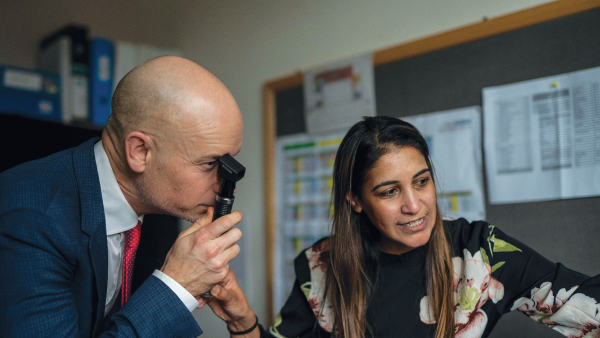Eye to (A) Eye
TVST study evaluates the effectiveness and diagnostic accuracy of physician-to-physician ophthalmology eConsultations
A new retrospective review conducted by a group of researchers from Tufts Medical Center, Massachusetts Eye and Ear, and Harvard Medical School has investigated whether the use of electronic consultations (eConsults) in ophthalmology – previously unreported for this specialty – might be of beneficial use to patients. Specifically, the research assessed the feasibility, diagnostic accuracy, and outcomes of these virtual consultations, offering valuable insights into the future role of eConsults – and telemedicine more broadly – in ophthalmology.
The team reviewed data taken from Massachusetts Eye and Ear between February 2019 and August 2021, looking at 100 patients who used an eConsult. All consultations involved clinical inquiries on non-urgent ocular conditions.
Key findings of the review indicate that all eConsults were responded to within an average of 1.6 days and, of the patients that were then referred for an in-person follow-up, 93 percent had diagnoses matching the eConsultant’s initial assessment.
Most of the non-urgent inquiries were related to triage, management, and diagnosis of ocular issues, with the most common ophthalmic condition being listed as chalazia/hordeola (14 percent of cases). Additionally, only 5 percent of patients chose to subsequently visit the emergency department for the same condition following their eConsult results.
Perhaps most importantly, the study highlights that eConsults can help streamline the triage process, reducing unnecessary referrals while ensuring that patients requiring further evaluation are appropriately directed to subspecialists. This type of virtual consultation system was also shown to alleviate patient and provider burden, facilitating timely access to specialty care without the need for immediate in-person evaluations.
Given the positive results, the study authors argue that eConsults have the potential to enhance ophthalmic care, especially given the increasing shortage of ophthalmologists in the country. eConsults represent a promising tool for managing non-urgent ocular conditions, they say, and may potentially help reduce healthcare costs and improve access to ophthalmic care. That said, the authors offer words of caution as to the limitations of such consultations, suggesting that the inability to perform physical examinations could result in occasional diagnostic errors.
The New Optometrist Newsletter
Permission Statement
By opting-in, you agree to receive email communications from The New Optometrist. You will stay up-to-date with optometry content, news, events and sponsors information.
You can view our privacy policy here
Most Popular
Sign up to The New Optometrist Updates
Permission Statement
By opting-in, you agree to receive email communications from The New Optometrist. You will stay up-to-date with optometry content, news, events and sponsors information.
You can view our privacy policy here
Sign up to The New Optometrist Updates
Permission Statement
By opting-in, you agree to receive email communications from The New Optometrist. You will stay up-to-date with optometry content, news, events and sponsors information.
You can view our privacy policy here







